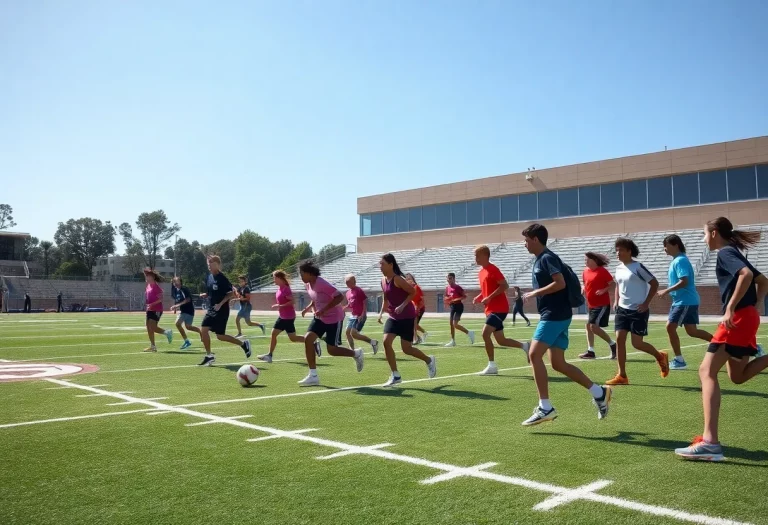News Summary
In Jurupa Valley, California, three female athletes have filed a federal lawsuit challenging the participation of a transgender athlete in their sports. They allege sex discrimination and civil rights violations under Title IX, claiming that the presence of the transgender athlete has led to an unfair competitive environment and personal invasions of privacy. This case is set against a backdrop of a national debate regarding transgender rights in sports, with the potential to influence policies in California and beyond.
Jurupa Valley, California: A Legal Firestorm Brews Over Transgender Athlete’s Participation
In an intriguing twist to the world of high school sports, three female athletes have taken a bold step by filing a federal lawsuit in the US District Court for the Central District of California. This case has sparked a passionate conversation around the involvement of transgender athletes in competitive sports, a topic that has been dominating national headlines lately.
The Plaintiffs and Their Concerns
The plaintiffs in this case, consisting of one adult and two minors, allege that they have experienced sex discrimination and civil rights violations under Title IX. They point to the participation of a transgender athlete they refer to as A.B. Hernandez, a senior at Jurupa Valley High School, as a pivotal factor in their claims. According to the lawsuit, this athlete’s presence on the track and volleyball teams has created an uneven playing field, leading to claims of unfair competition.
Madison McPherson, who used to compete in varsity track and field, soccer, and volleyball, along with her fellow athletes Alyssa McPherson and Hadeel Hazameh, argue that since Hernandez joined the teams, their rankings have slipped, and competitive events have been skewed. Some of their rivals went so far as to forfeit matches rather than face off against Hernandez. This trend has raised eyebrows and provided fuel to a nationwide conversation surrounding transgender athletes’ rights.
Arguments Presented in the Lawsuit
The lawsuit is not just about sports performance; it goes deeper, touching on issues of privacy and safety. The plaintiffs claim that they have faced a significant invasion of privacy by sharing locker room spaces with a transgender individual. Furthermore, they express feelings of risk concerning safety and even report instances of sexual harassment. They argue that Hernandez’s inclusion has deprived them of equal educational opportunities, a serious accusation that underscores the emotional and psychological toll this situation has taken on them.
In their complaint, the athletes outline their struggles, including how one plaintiff, in particular, decided to step back from the upcoming track season due to consistently losing to Hernandez. The lawsuit highlights perceived biological advantages that the plaintiffs feel have influenced the competitive environment. Additionally, Hazameh’s case brings a religious perspective into the discussion, citing her religious obligations that prevent her from being exposed to males, thereby complicating her athletic experience.
The Fallout and Wider Implications
As this legal case unfolds, it shines a light on the broader national debate regarding transgender women and girls in sports. With over two dozen states exploring bans on transgender athletes from female sports, the conversation around inclusion and fairness is more charged than ever. California itself is caught in the crossfires, as state laws favor the rights of transgender students, allowing them to participate in sports consistent with their gender identity.
The California Department of Education and the California Interscholastic Federation have thus far refrained from making comments on the ongoing litigation, but the implications of this case could reverberate throughout the state’s approach to the intersection of sports and gender rights.
What Lies Ahead?
The lawsuit is seeking unspecified monetary damages and aims to block any male students from competing in female sports in the district. As this case makes its way through the legal system, it promises to bring further scrutiny and conversation to the sensitive landscape of youth sports and transgender inclusion.
As Nereyda Hernandez, the mother of the transgender athlete involved, emerges as a voice for compassion, it reminds everyone that this debate is not just about athletes or laws—it’s about real people, their identities, and their experiences. As the dust settles and the court proceedings progress, observers and participants alike will be watching closely to see how this complex issue unfolds in the competitive arena of high school athletics.
Deeper Dive: News & Info About This Topic
LIVE BALL Resources
Controversy Over Transgender Athlete Participation in Jurupa Valley
St. Paul Discusses Transgender Athletes in High School Softball
Minnesota Girls High School Tennis Welcomes Third Class
Transgender Athlete Sues Swarthmore College and NCAA
Transgender Woman Files Lawsuit Against NCAA and Swarthmore Over Exclusion from Women’s Track Team
Las Cruces Celebrates Fall Sports Media Day
Transgender Athlete Evie Parts Sues NCAA and Swarthmore College Over Discrimination Claims
Minot Celebrates 2025 Scholarship Winners in Golf
Minnesota High School Girls Tennis Introduces New Class
New Leadership and Talented Additions for Paxton Cross Country
Additional Resources
- CNN
- Wikipedia: Transgender Athletics
- San Francisco Chronicle
- Google Search: California student athlete transgender lawsuit
- The Oak Leaf News
- Google Scholar: Title IX transgender
- Press Democrat
- Encyclopedia Britannica: Title IX
- ABC7
- Google News: California transgender athlete lawsuit


